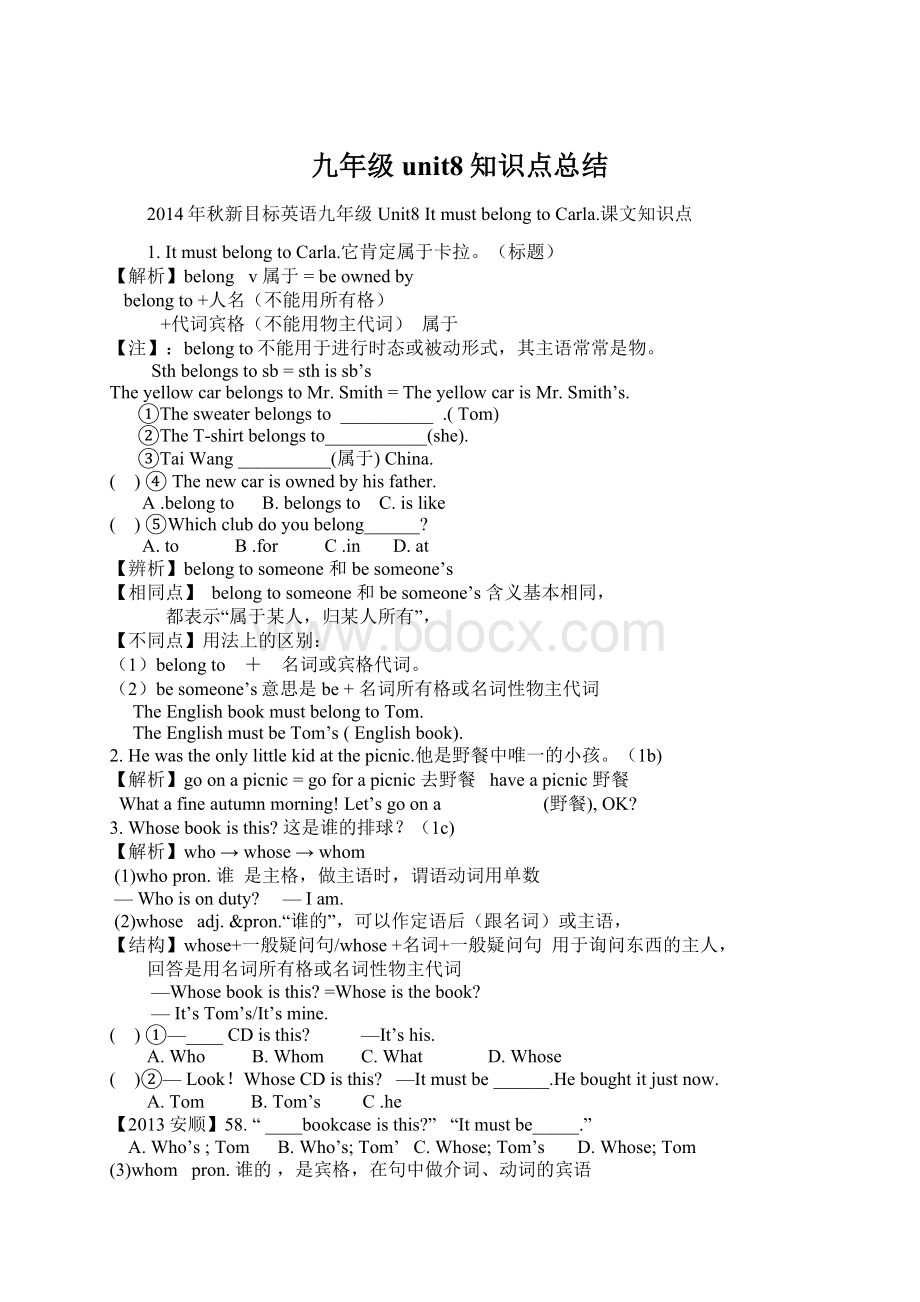九年级unit8知识点总结.docx
《九年级unit8知识点总结.docx》由会员分享,可在线阅读,更多相关《九年级unit8知识点总结.docx(16页珍藏版)》请在冰豆网上搜索。

九年级unit8知识点总结
2014年秋新目标英语九年级Unit8ItmustbelongtoCarla.课文知识点
1.ItmustbelongtoCarla.它肯定属于卡拉。
(标题)
【解析】belong v属于=beownedby
belongto+人名(不能用所有格)
+代词宾格(不能用物主代词) 属于
【注】:
belongto不能用于进行时态或被动形式,其主语常常是物。
Sthbelongstosb=sthissb’s
TheyellowcarbelongstoMr.Smith=TheyellowcarisMr.Smith’s.
①Thesweaterbelongsto __________ .(Tom)
②TheT-shirtbelongsto___________(she).
③TaiWang__________(属于)China.
( )④Thenewcarisownedbyhisfather.
A.belongto B.belongsto C.islike
( )⑤Whichclubdoyoubelong______?
A.to B.for C.in D.at
【辨析】belongtosomeone和besomeone’s
【相同点】 belongtosomeone和besomeone’s含义基本相同,
都表示“属于某人,归某人所有”,
【不同点】用法上的区别:
(1)belongto + 名词或宾格代词。
(2)besomeone’s意思是be+名词所有格或名词性物主代词
TheEnglishbookmustbelongtoTom.
TheEnglishmustbeTom’s(Englishbook).
2.Hewastheonlylittlekidatthepicnic.他是野餐中唯一的小孩。
(1b)
【解析】goonapicnic=goforapicnic去野餐 haveapicnic野餐
Whatafineautumnmorning!
Let’sgoona (野餐),OK?
3.Whosebookisthis?
这是谁的排球?
(1c)
【解析】who→whose→whom
(1)whopron.谁 是主格,做主语时,谓语动词用单数
—Whoisonduty?
—Iam.
(2)whose adj.&pron.“谁的”,可以作定语后(跟名词)或主语,
【结构】whose+一般疑问句/whose+名词+一般疑问句 用于询问东西的主人,
回答是用名词所有格或名词性物主代词
—Whosebookisthis?
=Whoseisthebook?
—It’sTom’s/It’smine.
( )①—____CDisthis?
—It’shis.
A.Who B.Whom C.What D.Whose
( )②—Look!
WhoseCDisthis?
—Itmustbe______.Heboughtitjustnow.
A.Tom B.Tom’s C.he
【2013安顺】58.“____bookcaseisthis?
” “Itmustbe_____.”
A.Who’s;Tom B.Who’s;Tom’ C.Whose;Tom’s D.Whose;Tom
(3)whom pron.谁的,是宾格,在句中做介词、动词的宾语
( )______wasthetelephoneinventedby?
A.Who B.Whom C.What D.Whose
4.ItmustbeMary’s.J.K.Rowlingisherfavoritewriter
它一定是玛丽的。
J.K罗琳是她最喜欢的作家。
(1C)
【解析】must表示肯定推测,“一定,肯定”,
(1)must一般用于肯定句,
表示对现在的情况进行推测、推断、猜测或判断,一般把握性较大。
Youmustbeveryhungry.Pleasecomeinandhavesomethingtoeat.
【贵州贵阳】“Whosenotebookisthis?
” “It_____Jim’s.Ithashisnameonit”
A.can’tbe B.mustbe C.canbe
(2)含有must推测的句子变为反意疑问句,要根据must后面的动词来确定
Theremustbesomethingwrongwiththebike,_____________?
(3)含有must推测的句子变为否定句时,用can’t“不可能”
Therecan’tbesomethingwrongwiththebike.
【拓展】mustn’t,表示“不准,禁止,不可以”
Youmustn’tlendthebooktoothers.
【四川绵阳】Schoolstudents_____smokebecauseitisagainsttheschoolrules.
A.needn’t B.couldn’t C.won’t D.mustn’t
【解析2】writer=author n作家
( )①Marktwainismyfather’sfavoriteauthor.
A.teacher B.writer C.doctor
( )②LaoSheisthe____ofTeaHouse.
A.writer B.visitor C.reporter
5. Iattendedaconcertyesterdaysoitmightstillbeinthemusichall.
昨天我参加了一个音乐会,所以它可能还在音乐厅。
(2d)
【解析】attendv出席;参加 attendameeting出席会议
【辨析】join/takepartin/attend
(1)join指加入某个党派,团体组织等,成为其中一员,意为“参军,入党,入团”。
jointheArmy/theParty/theLeague
joinsb.in(doing)sth.和某人一道做某事
Willyoujoinusinthepicnic?
你参加我们的野炊吗?
joinin多指参加小规模的活动如“游戏,比赛”,口语中常用。
Joininthebasketballgame. 参加篮球赛。
(2)takepartin指参加群众性活动,着重说明主语参加该项活动并在活动中发挥作用。
We’lltakepartinthesportsmeeting/club.
takeanactivepartin积极参加……
(3)attend正式用语 attendedaconcert ______________
vt.指参加会议,婚礼,葬礼,典礼;去上课,上学,听报告等。
句子主语只是去听,去看,自己不一定起积极作用。
DidyouattendthemeetinglastSunday?
①Somemodelteacherswereinvited__________ (attend)themeeting.
②I (参加音乐会)lastnight.Itwaswonderful.
6.Doyouhaveanythingvaluableinyourschoolbag?
(2d)
你书包里有什么贵重的东西吗?
【解析】valuen价值 → valuable adj.贵重的;很有用的;宝贵的
Ithinknothingelseintheworldismore___________ (有价值的)thanmyparents’love.
7.Soitcan’tbestolen.所以它不可能被偷(2d)
【解析】can’t “不可能”,是否定推测,语气较有把握。
( )—Whoseshoesarethese?
—They____beMike’s.Theyaremuchtoolargeforhim.
A.might B.may C.mustn’t D.can’t
8.IrememberIhadmyschoolbagwithmeatthepicnic.
我记得野餐时我背着我的书包了。
(2d)
【解析】remember v 记住(反) forget
(1)rememberdoingsth记得做过某事(已做了)
(2)remembertodosth记住要做某事(还没做)
①Don’tyouremember_____________(see)somewhereinEnglandlastweek?
②Pleaseremember_______________(close)thewindowwhenyouleave.
9.Ileftearly,beforetherestofmyfriends.我先于我的其他朋友早早就离开了。
(2d)
【解析】restv休息 n剩余部分
“therestof+名词”时,谓语动词的数要与therestof所表示的名词的数保持一致
( )Therestofthestudents ____intheclassroom.
A.isstudying B.arestudying C.bestudying D.isstudied
10.Ithinksomebodymusthavepickeditup.我认为一定有人捡到它了(2d)
【解析】pickup接电话
pickup 接电话 Tom,Icalledyou,butyoudidn’tpickup
捡起;拾起 Ipickupawalletonmywayhome
(开车)接某人 Iwillpickyouupatthestation
学到;获得 Hewaspickinguptheskillsquickly.
【2012陕西2】25.TheworkersintheHuashanMountainshaveto______
rubbishtokeepthemountainsclean.
A.turnup B.pickup C.mixup D.giveup
【2013湖北武汉1】Itseemsthattheagedpeople____theH7N9moreeasilyfrom
therecentcase.
A.pickup B.mixup C.setup D.useup
11. I’llcallthemnowtocheckifanybodyhasit
我现在打电话问问他们是否有人捡到它了。
(2d)
【解析】 anybody pron.任何人
(1)anybody是不定代词,表示“任何人,无论什么人”。
anybody与somebody相对应,
但是anybody常用在否定句、一般疑问句或条件句中,用在 肯定句中表示“任何人”。
(2)anybody作主语时,谓语动词用单数 形式。
【拓展】由body组成的不定代词:
some somebody某人;有人
any = anybody任何人
no nobody没有人
every everybody每个人;人人
【2013•德州】 —WhohelpedBettytidyupthebedroomjustnow?
—________.Shecleaneditallbyherself.
A.Somebody B.Nobody C.Everybody D.Anybody
【拓展】不定动词的用法:
(1)构成:
some,any,every,no都能和one,body,thing一起构成复合不定代词
a.some构成的复合不定动词(something,somebody,someone)用于肯定句
b.any构成的复合不定动词(anything,anybody,anyone)用于否定句或疑问句;
c.no构成的复合不定动词(nothing,nobody)用于肯定句,表否定意思
d.every构成的复合不定动词(everything,everybody,everyone)用于肯定句
(2)复合不定动词作主语,谓语动词用单数
Everybodyishere.
(3)修饰不定动词的定语要后置
somethinginteresting有趣的东西 somethingtoeat吃的东西
(4)在表示请求、建议、反问等语气的疑问句中,问话者希望得到肯定回答时要用something,somebody,someone
—Wouldyoulikesomethingtodrink?
—Yes,please.
(5)在反意疑问句中,somebody,anybody等作主语时,附加问句用he或they;something,everything等作主语时,附加问句用it.
Nobodyisintheclassroom,ishe/arethey?
Everythingisready,isn’tit?
( ①)Wecan’tfind____inthehouse.
A.somethingstrange B.anythingstrange
C.strangesomething D.strangeanything
( )②Haveyoudone____toimprovetheenvironment?
A.somethinguseful B.anythinguseful C.nothinguseful D.usefulanything.
【2013黑龙江哈尔滨】3.______wasbornbeinggoodatallthings.Youcandowellinthingsthroughhardwork.AsanEnglishlearner,youcan’tbeexcellentwithoutenoughpractice.
A.Everybody B.Somebody C.Nobody
【2013湖南衡阳】13.—Mum,I’mhungry.Isthere_____toeat?
—Yes,youcanhavesomebreadonthetable.
A.something B.nothing C.anything
12.Whenhewasinterviewedbythetownnewspaper,hesaid,“Everynightwehearstrange
noisesoutsideourwindow.(3a)
当他被镇上的报社采访的时候,他说:
“每天晚上我们听见窗户外面有奇怪的声音....”
【解析】noisen噪音→noisyadj.吵闹的→noisilyadv吵闹地
makeanoise制造噪音
①Sometimesthestudentsget_________whentheystudyingroupsduringtheevening(noise)
【广西崇州】Thechildrenoftenget_________(noise)intheclassroomafterclass.
【拓展】noise,voice与sound辨析:
(1)noise意为“噪声”,指不悦耳的________________等,可以用a,some,much等词修饰。
(2)voice意为“声音”,多指人的说话声、歌声和笑声等。
(3)sound可以指听到的自然界的一切声音。
( )—Didyouhearanystrange________whenthequakehappened?
—No,Iwasinmygardenwithmyflowersandwasenjoying
thebeautiful________ofmybirdsatthattime.
A.voice;noise B.noise;sound C.whisper;sound D.sound;voice
13.Myparentscalledthepolicemen,buttheycouldn’tfindanythingstrange.
我的父母给警察打电话了,但是他们没有找到任何奇怪的东西。
(3a)
【解析】policemenn男警察 (pl)policemen
Policewoman女警察(pl)policewomen
【短语】policestation警察局 policecar警车 callthepolice报警
( )A_____sawtwothievesstealingagirl’smobilephoneonthebusandhecaught
thematonce.
A.Police B.policeman C.policewoman D.polices
【注】policen警察 (集体名词,做主语时,谓语动词用复数形式)
Thepolicearelookingforthelostchild.
Some_____________ (policeman)weresearchingthehouseforusefulclues(线索).
14.Atfirst,Ithoughtthatitmightbeadog,butIcouldn’tseeadog,oranythingelse,either.
起初,我认为它可能是一只狗,但我没有看见狗,也没有看见其他任何东西。
(3a)
【解析1】else.
else与other的区别:
二者均有“别的;其他的”意思,
⑴else修饰疑问词或不定代词,放所修饰词之后;
【注】当else修饰不定代词时,所有格应该放在else上,而不应该放在代上,somebodyelse.Anybodyelse等的所有格形式是somebodyelse’s;anybodyelse’s等
orelse否则,要不然
Idon’twanttogetanybodyelse’smoneyandhelp.
⑵other修饰名词,且放名词前。
【记】—Ishetallerthanany__________studentinhisclass?
—Soheis.Heistallerthananybody________inhisclass.
( ) ①.What doyouwanttosay?
( ) ②.What thingdoyouwant?
A.else B.other C.another D.still
( )③Wouldyoulike_____?
A.elsesomething B.anythingelse C.elseanything Dsomethingelse
【解析2】either
【辨析】too/also/either的用法
too “也”肯定句。
句末。
also “也”肯定句。
句中,be后面,行为动